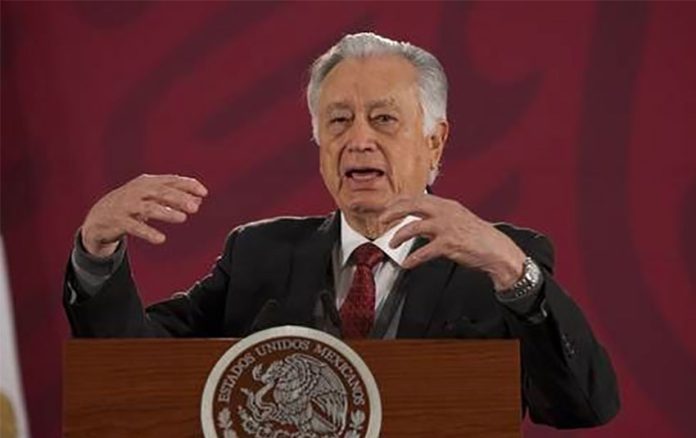The director of the Federal Electricity Commission (CFE) has vowed to put an end to “simulation and fraud” committed by renewable energy firms at the expense of the state-owned company.
In an interview with the newspaper La Jornada, Manuel Bartlett said the CFE has filed complaints against renewable energy firms with the Energy Regulatory Commission (CRE), an ostensibly autonomous federal body.
He said that renewable firms have an unfair advantage because they don’t pay the CFE for using its transmission lines to transport the energy they generate nor do they pay the state-owned company for the backup power they use.
Not paying for transmission or backup power allows the private firms to save billions of pesos, Bartlett said.
The CFE chief also charged that renewable firms have acted fraudulently by passing off other private companies as their business partners rather than their customers.
Bartlett said that large companies like corporate conglomerate Grupo Salinas, convenience store chain OXXO, big-box store Walmart, cinema chain Cinépolis, manufacturer Kimberly Clark and others pay very low electricity rates because they are passed off as partners of firms such as Iberdrola, Enel Energía and American Light and Power.
Their “simulated” partnerships allow the client firms to receive electricity without paying for transmission costs, he said.
Bartlett told La Jornada that he hopes that the CRE resolves the issues soon and corrects “illegal, irrational and unfair” decisions it took in favor of private firms during the six-year term of the government led by former president Enrique Peña Nieto.
The decisions taken by the CRE during the term of the previous government allowed private, mainly foreign companies to make huge profits at the expense of the CFE, he said.
Bartlett asserted that the federal government is “not against clean energy” and that “what’s established by the [2014] energy reform will be respected” but stressed that “what we’re not going to allow is for this large social vocation company, the CFE, to continue to be used to bolster private companies.”
“That would … go against the national interest,” he said.

“The large companies of Mexico, those with the most capital, are cheating in order to pay a lot less for the electricity their businesses consume while at the CFE we’re struggling, counting every centavo so that the impoverished people of Mexico pay as little as possible,” Bartlett said.
“It’s not a [fair] electricity market, it’s theft, heaven on earth for the [renewable energy] investors that have illegally seized [the business of] large consumers,” he said.
Bartlett accused Peña Nieto of attempting to kill off the CFE and leave the energy market in the hands of private foreign companies.
Both President López Obrador and the CFE chief, an 84-year-old former federal cabinet minister and ex-governor of Puebla, say they are committed to “rescuing” the state-owned firm while keeping power costs down.
Bartlett charged that private companies were allowed to establish wind and solar projects “wherever they wanted” and without proper planning. As a result, their energy generation capacity is frequently interrupted, he said.
“Every time that a cloud goes by or the wind doesn’t blow, they don’t generate energy,” Bartlett said, explaining that at such times renewable companies tap into CFE-generated base load power to maintain supply.
“It’s called backup and they don’t pay for it either. That’s why the energy they generate is cheaper; it proves the falseness of [the claim] they’ve disseminated: that our power is more expensive and that our infrastructure is obsolete,” he said.
“Now that we want to put an end to this plunder and fraud … they’re accusing us of being inefficient and of wanting to put an end to clean energy. … Whoever comes to do business here has to pay for transmission costs, distribution costs and backup. We have no reason to continue subsidizing them,” Bartlett said.
He made similar remarks in an interview with the news agency Reuters on Friday, asking: “Do you think it’s fair for the CFE to subsidize these companies that don’t produce power all day?”
In response, the Confederation of Industrial Chambers (Concamin) denied that private energy companies are getting a free ride.
“The private companies that operate in the electricity market do pay the CFE to use the transmission lines to transport the energy they produce to their clients. The payment is made monthly according to the regulated rate set by the Energy Regulatory Commission,” Concamin said in a statement.
“Therefore, Bartlett is lying when he suggests that private companies are not paying to use the CFE transmission lines,” the business group said.
With regard to his subsidy claim, Concamin asserted that “renewable energy is not subsidized in Mexico.”
“Mr. Bartlett should know” that plants that produce base load power receive an additional payment that “recognizes their capacity to produce all day” whereas renewable energy plants are only paid for the power they generate, the business group said.
Concamin also highlighted that it’s not just renewable energy companies that generate power intermittently, pointing out that the CFE has hydroelectric plants that depend on rain as much as wind and solar-powered plants depend on gust, gales and sunshine.
“Will Mr. Bartlett apply the backup payment to his intermittent hydroelectric plants? We don’t think so,” it said.
Will privately owned-plants that produce base load power be allowed to collect the backup power payment? asked Concamin before again responding “We don’t think so.”
Tensions between the federal government and the renewable energy sector have intensified this month after the National Energy Control Center published an agreement in late April that suspended national grid trials for new clean energy projects.
The federal Energy Ministry subsequently published a new energy policy in mid-May that imposes restrictive measures for the renewable energy sector that could effectively prevent its expansion in Mexico and consolidate control of electrical power in the CFE.
The government also has its eyes on renegotiating contracts with three companies that operate wind farms in Oaxaca, according to a report by the newspaper El Universal.
Anonymous energy sector sources told El Universal that the government wants to set new conditions for the purchase of energy by the CFE from the Oaxaca wind projects operated by Spain’s Iberdrola, Acciona and Grupo Cobra.
The companies signed contracts with the government for 20 years in 2010, meaning that they are only at the halfway point of their lifespan. In those 10 years, the CFE has paid the companies just over 19.7 billion pesos (US $872.5 million at today’s exchange rate).
Asked about its knowledge of the plan to modify the contracts, the Mexican Association of Wind Energy (AMDEE) acknowledged that “it’s something that could happen.”
However, the association said that if the CFE were to breach its obligations under the contracts, the companies could sue the government for lost income.
The government cannot unilaterally modify or terminate contracts, the AMDEE said, charging that the Finance Ministry might have to involve itself in the matter in order for a resolution to be reached.
The association noted that federal authorities have said that will not seek to alter previously-signed contracts but added that they have not always kept their word.
The CFE last year filed requests for arbitration in international courts as part of efforts to annul clauses in seven gas pipeline contracts before reaching an agreement with three private companies that López Obrador said would save Mexico US $4.5 billion.
Source: La Jornada (sp), Expansión (sp), El Universal (sp)
